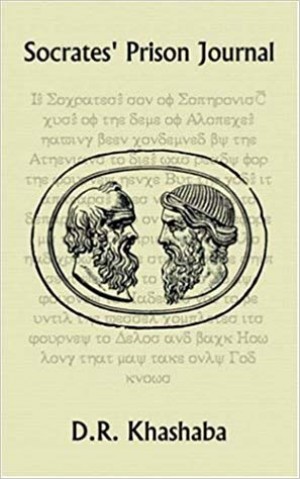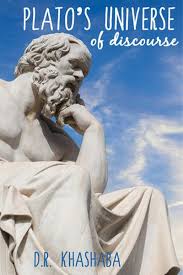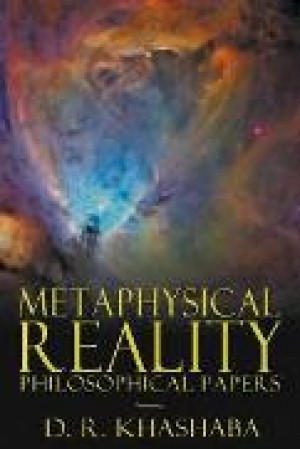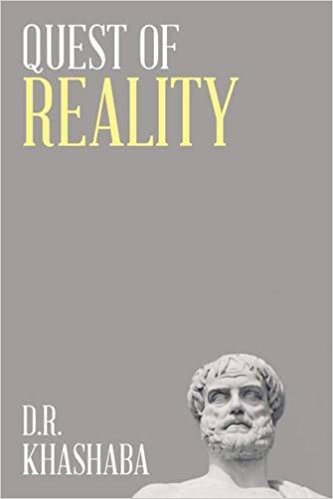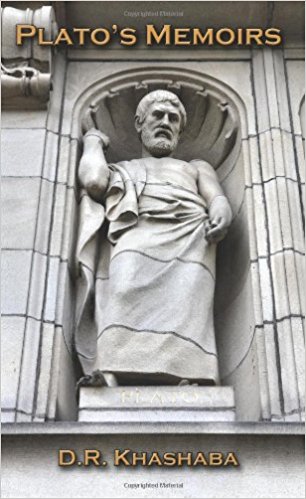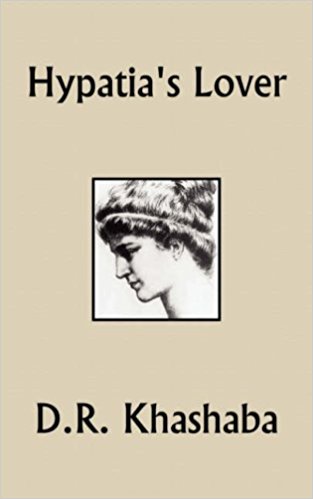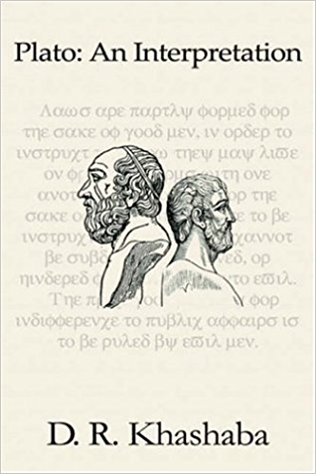Khashaba, D. R., Egyptian, b.1927, is an independent philosopher. A widower with one daughter, Hanan, and one granddaughter, Farah, Khashaba lives in his home-country, Egypt.
Khashaba lately made all his works freely available on https://archive.org/search.php?query=D%20R%20Khashaba and on http://philosophia937.wordpress.com
Translation of Khashaba’s works into Arabic was started by the National Center for Translation. Four translations were released between 2010 and 2012 but publication of the fifth was stalled for reasons known to the Center.
Website: http://philosophia937.wordpress.com
Weblog: http://khashaba.blogspot.com
Publications:
"The Sphinx and the Phoenix," by D. R. Khashaba. ISBN 978-1-60264-309-3, softcover. 376 pages.
This is a collection of philosophical essays, gropings for light in the dark den of life, so why the Sphinx and the Phoenix? To philosophize is to question everything, to subject all things to What? And to Why? There you have the Sphinx. What about the Phoenix? Philosophy is concerned with the ultimate mysteries of being, understanding, and value. In seeking to represent the ultimate and the absolute in finite and determinate formulations of thought, philosophy can only speak in allegory, metaphor, and myth and must constantly, as Plato insisted, destroy its own foundational postulates. True philosophy must burn in the fire of dialectic that from the ashes, Phoenix-like, new intelligible worlds may arise bringing with them enlightenment and insight. The essays range widely from the nature of philosophical thinking to the problem of free will, from Kant and Plato to Wittgenstein and Russell, from the objectivity of values to a critique of religion, from the creationism-evolutionism controversy to the brain-mind riddle, and together they reflect an integrative philosophy that the author characterizes as an original version of Platonism.
Let Us Philosophize
Second Revised Edition by D.R. Khashaba. ISBN 978–1-60264–232–4. 272 pages.
This is a revised edition of a book that first appeared in 1998. The author has since published three other books, yet “Let Us Philosophize” remained the one that gives the author’s philosophy as an integrative whole. It presents a philosophy developed over a lifetime, in which questions about ultimate reality, knowledge, and values are interrelated in a coherent system. This is an approach frowned upon by most present-day academic and professional philosophers. The book indeed seeks to challenge the dominant analytic approach which has reduced philosophy to specialized disciplines and techniques which cannot approach the ultimate questions that originally gave rise to philosophy. Only by audaciously daring to philosophize ‘in the grand manner’ can philosophy once more be meaningfully relevant to life and human needs. However, in raising ultimate questions, the author does not pretend to offer acceptable solutions or ‘true’ answers. A philosophy that professes to offer truth on a platter is worse than worthless. This book seeks to provoke readers to question themselves and question the world and to venture on the soul-searching travail necessary for understanding their own mind and building up their own philosophy.
Plato: An Interpretation
ISBN 978-1-58939-721-7. Softcover. 320 Pages.
Our understanding of Plato and our understanding of the nature of philosophy are two sides of a coin. The dominant academic conception of the nature of philosophical thinking vitiates both our understanding of philosophy and our interpretation of Plato. Plato gave us the profoundest truths about ourselves and about Reality in winged myths. Our learned scholars turn the myths into silly dogmata, into transparently erroneous doctrines, and all is lost: the inspirational core, the inspired insight, is dissipated when its housing shell of myth is shattered.
No one is entitled to claim a monopoly on understanding Plato's 'true' meaning, and I certainly make no claim. I neither pretend nor intend to arrive at what Plato thought or taught. Plato has left us some thirty pieces of verbal composition, which he created for his own amusement. I enter into living dialogue with the living Plato and offer the understanding I come out with for myself from that dialogue, not claiming any authority or veracity for my interpretation. I do what Plotinus did; I draw from the flowing founts of Plato to water my own garden and offer my version of Platoism for what it may be worth intrinsically.
Socrates' Prison Journal
ISBN 1-58939-848-3. Softcover. $13.95. 220 pages.
Socrates spent thirty days in prison awaiting execution. The author makes Socrates keep a prison journal in which he seeks to sum up the meaning of his life and his life's work. In imaginative reminiscences, meditations and fictional conversations Socrates discusses aspects of his philosophy, clears up misunderstandings and answers objections - misunderstandings and objections that are as rife today as they were among Socrates' contemporaries and immediate followers.
With Aspasia, the beautiful and gifted wife of Pericles, Socrates discusses Protagoras' agnostic stance regarding the existence of the gods. Repeatedly he voices his hopes and his fears about what might become of his philosophy in the hands of Plato. In a prophetic dream Socrates even discusses with Aristotle the latter's criticisms of Socrates' moral philosophy. In conversations with Diotima of Mantinea the author creatively develops aspects of Socrates' and Plato's philosophy.
The notes appended to the journal explain for the benefit of the lay reader biographical and historical allusions and expand somewhat upon certain issues. An Appendix deals with Plato's account of the last moments of Socrates, which has been questioned by some scholars. Within its fictional framework, the book offers a philosophy addressing the human situation in the twenty-first century.
Hypatia's Lover
ISBN #1-58939-973-0, softcover, $13.95
This is a fictionalized account of the last days of Hypatia’s life, leading to her brutal murder during Lent, 415 AD. The fictional love story is treated allusively, in very light touches, mostly through fleeting recollections evoked by incidents in the sad love stories of two of her students. The tragic tale is followed by a collection of imaginary excerpts from lectures and speeches of Hypatia. In the story line the author has not tampered with any known facts. The philosophy presented in the imaginary lectures and speeches is confessedly the author’s own. This is rendered pardonable and necessary by the fact that, thanks to the Church, Hypatia’s philosophical works have been completely lost to us. If the moving portrayal of Hypatia’s tragedy is met with ire in some quarters, the author offers no apology and has no regret. Hypatia’s atrocious slaughter is a sore wound in the human conscience that must be kept smarting if it is not to fester and poison the whole human body.
Plato’s Memoirs
ISBN #978-1-60264-612-4, softcover, $12.95
In line with his fictional Socrates’ Prison Journal (2006), the author makes Plato put off the revision of his last work, the Laws, to write his memoirs, reflections on his life and works. The idea is audacious but requisite to clear away misunderstandings and falsehoods that have accumulated around Plato’s work and thought and are being taken earnestly and without question by scholars and students of philosophy.
Plato wrote dramatic plays, intended as such. As in all imaginative literature, the surface is all play, but below the surface the message is fully earnest. Thus arguments and theoretical formulations are to be taken in proper perspective as part of the dramatic give and take, while the moral values, the philosophy of life, and the underlying metaphysical vision should be taken most seriously. This is antipodal to the mainstream academic approach which focuses critically on arguments and theory while disdaining the ‘foolish’ morals and ‘fancy’ metaphysics. My purpose is to induce at least a few people to take those values and that philosophy of life seriously, not just as the subject of astute academic dissertations.
Quest of Reality
ISBN N 978-1-62137-252-3. 282 pages. $14.95.
The author describes his work as a personal statement, giving his personal account of wrestling with the questions that have puzzled all thinking humans from the beginning. This personal account is not offered for acceptance, but as incitement and a challenge to help the reader puzzle on, for it is in this ferment of puzzling over the mysteries of life and reality that we live as thinking human beings. In form, the book traces the human quest for Reality from the first gropings of primitive humans through the speculations of modern philosophers to the author's own confessedly personal vision. In this book, the author highlights two original features of his philosophy, radically opposed to common acceptations: (1) the oracular nature of philosophy and, in consequence, the essentially mythical character of philosophical expression; (2)the principle of creativity as an original dimension of reality which alone renders free will possible and renders becoming intelligible. The book presents a system of philosophy in the grand manner that has been out of fashion for nearly a century but that D.R. Khashaba believes is the only genuine form of philosophy worth the name.
Metaphysical Reality
ISBN 978-1-62137-555-5 (softcover). $13.95. 204 pages.
This book challenges mainstream views on the nature and function of philosophy. Philosophy has been trapped in a bad predicament, having been placed in a losing contest with empirical science and in a meaningless context with dogmatic theology. To regain for philosophy her rightful vital role in human life we have to go back to Socrates and Plato. Socrates saw that philosophy has nothing to do with the investigation of the natural world, her sole concern being to make us look inwards to examine our ideas, ideals, and values to understand ourselves. Plato knew that the insight given us by philosophy into our inner reality cannot be encapsulated in definitive formulations but has to be conveyed in ever-renewed parables, metaphors, and myths. Philosophy is more akin to poetry than to science. A genuine philosopher does not seek to attain any objective knowledge of final truth but to philosophize and to live philosophically. The author does not ask the reader to accept the views offered in these essays but to enter into dialogue with these views to develop her or his own position, for the true worth of a philosophical work is to prod the reader to philosophize
PLATO'S UNIVERSE OF DISCOURSE ISBN 978-1-62137-742-9 (eBook) 198 pages $7.99
Traditional philosophy has been pronounced dead. Humankind, under the governance of a hubristic science bereft of wisdom, is rapidly hurtling towards self-destruction. To save humanity, philosophy as understood by Socrates and Plato must be revived. Hume undermined both science and philosophy. Kant came to the rescue of science but had no comfort for philosophy; his Copernican revolution only went halfway. It's high time to radically revolutionize current conceptions of the nature of philosophy and philosophical thinking. We have to make philosophy once again relevant to human aspirations and once again capable of having a role in fighting the false conceptions and false values that are undermining human civilization. This book goes out as "a voice of one crying in the wilderness: Make straight the way" of Queen Philosophia to her rightful throne, to guide human life and guard the ideals and values that endow humanity with its worth, to avert the annihilation that the hubris of knowledge devoid of wisdom is fast driving us to.
CREATIVE ETERNITY: A METAPHYSICAL MYTH
Excerpts from the preface:
“This book has a message, a life message … for philosophy proper is primarily concerned with the meaning and value of life. Hence the book, beginning with a critique of metaphysics, ends with a dire warning of the impending doom of the human race.
“We have to revolutionize our understanding of philosophy, of metaphysics and of metaphysical reality; we need a more far-reaching revolution than Kant’s Copernican revolution. I audaciously claim that I bear the banner of that revolution.
“… I make bold to boast: this is philosophy in the grand manner; this is the most significant metaphysical work in more than a century. …”

